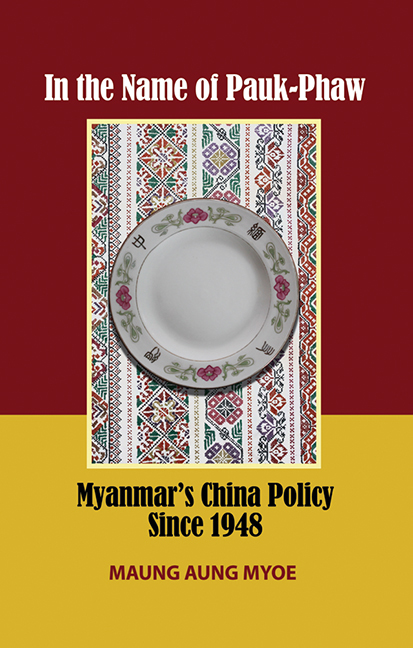Book contents
- Frontmatter
- Dedication
- Contents
- About the Cover
- Acknowledgements
- Chinese Names
- 1 Introduction
- 2 Sino-Myanmar Relations 1948–1962: The Years of Charting the Water
- 3 Sino-Myanmar Relations 1962–1988: Into the Years of Living Dangerously
- 4 Sino-Myanmar Relations 1988–2010: Towards Closer Cooperation
- 5 Conclusion
- Appendices
- Bibliography
- Index
- About the Author
4 - Sino-Myanmar Relations 1988–2010: Towards Closer Cooperation
Published online by Cambridge University Press: 21 October 2015
- Frontmatter
- Dedication
- Contents
- About the Cover
- Acknowledgements
- Chinese Names
- 1 Introduction
- 2 Sino-Myanmar Relations 1948–1962: The Years of Charting the Water
- 3 Sino-Myanmar Relations 1962–1988: Into the Years of Living Dangerously
- 4 Sino-Myanmar Relations 1988–2010: Towards Closer Cooperation
- 5 Conclusion
- Appendices
- Bibliography
- Index
- About the Author
Summary
Myanmar's China policy since 1988 has been essentially directed toward securing and consolidating Chinese political support for the government in international and regional forums. To this end, the Myanmar government makes full use of its geopolitical realities, geostrategic position and economic resources to keep China committed to Myanmar's cause. Although Myanmar has cultivated a very close Pauk-Phaw relationship with China and although China has practically become Myanmar's security guarantor, Yangon has always tried to find alternatives to counter China's growing influence in the country. This is by no means intended as a balance against China since Beijing does not currently pose a threat to Myanmar. To the government in Yangon (or Naypyitaw), Myanmar occupies a strategic position that deserves attention from Beijing. In September 1991, in the state-owned newspaper, a senior Tatmadaw officer stated: “The two nations have resolutely resolved that whoever governs them and whatever systems they practise, they will continue to uphold the traditional friendship for ever and ever because these two nations, according to geopolitics, are interdependent”. Again, a decade later, in the words of an official spokesman of the SLORC/SDPC government, Myanmar is “the weak link in the regional China containment policy”, although he did not elaborate further. It is fairly clear, however, that the Myanmar leadership believes that China has always regarded their country as an important factor in her security calculus.
When the International Crisis Group (ICG) published a timely report entitled “China's Myanmar Dilemma” on 14 September 2009, detailing China's frustration over what was described as the “erratic and isolationist behaviour of the military leadership” in Naypyitaw, the report, citing interviews with Chinese diplomats, stated that “while China holds a prominent place in Myanmar's foreign policy, the reverse is hardly true and Myanmar is currently a low priority for Beijing”. It further noted that “this loss of priority has been noted by Myanmar, which has become increasingly suspicious of China's strategic intentions [and] many in Myanmar fear that China might use it as a bargaining chip in its relations with the U.S.”.
- Type
- Chapter
- Information
- In the Name of Pauk-PhawMyanmar's China Policy Since 1948, pp. 105 - 178Publisher: ISEAS–Yusof Ishak InstitutePrint publication year: 2011



